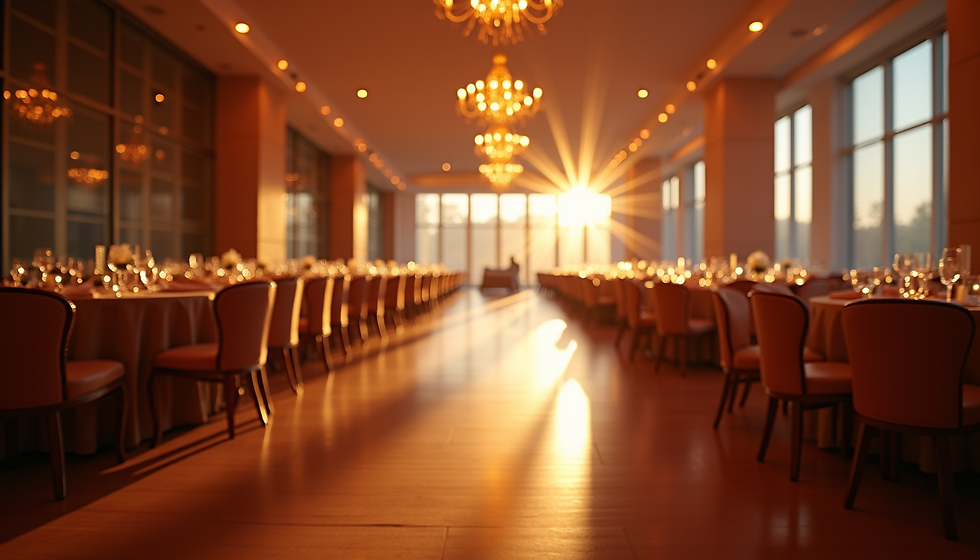How to Choose the Best Lighting Setup for Your Event
- coolrayzlighting
- Jun 10, 2025
- 3 min read
Choosing the right lighting for your event is crucial. Whether you're planning a wedding, corporate event, or a birthday party, the right lighting can transform a space, enhance the atmosphere, and highlight the key elements of your gathering. In this blog post, we will explore various aspects of event lighting and how to select the best setup for your unique needs.
Understanding Event Lighting
Event lighting is not just about illuminating a space; it's about creating an ambiance that captivates your audience. Proper lighting can set the mood, highlight important features, and even affect people’s emotions.
Consider a study by the International Journal of Event Management Research, which indicates that proper lighting can enhance guest satisfaction by up to 30%. This statistic emphasizes the importance of thoughtful lighting design.
To effectively choose your lighting, begin by assessing your venue’s existing lighting conditions. Natural light, dim areas, and reflective surfaces all play a role in your overall lighting strategy.

Types of Event Lighting
Different types of event lighting serve various purposes. Here are a few popular options you might consider:
1. Ambient Lighting
Ambient lighting provides a soft, overall illumination in a space. Examples include:
Chandeliers
Soft LED bulbs
Uplighting on walls
This type of lighting creates a warm and inviting atmosphere, making it ideal for weddings and formal gatherings.
2. Task Lighting
Task lighting focuses on areas where specific activities take place, such as dining areas or stages. This type includes:
Spotlights
Table lamps
Directional lights
Choose task lighting to ensure attendees can easily see menus or speakers during presentations.

3. Accent Lighting
Accent lighting highlights specific features or areas in your venue. Whether it’s artwork, floral arrangements, or a cake display, accent lighting can:
Use colored lights to complement the theme
Direct attention where you want it
Think of accent lighting as a way of adding drama and interest to your event.
4. Decorative Lighting
This type of lighting is primarily aesthetic. It serves as part of the decor rather than functional light. Popular examples include:
String lights
Neon signs
Lighted displays
Incorporating decorative lighting can amplify your event theme and enhance the overall aesthetic.
Planning Your Lighting Setup
Once you've familiarized yourself with different types of lighting, the next step is to plan your setup. Here’s how to approach it:
Understand Your Venue: Walk through the space to identify existing light sources, dark areas, and architectural features.
Define Event Goals: What do you want to achieve with your lighting? Is it a romantic ambiance or an energetic party atmosphere? Clearly outline your objectives.
Create a Lighting Layout: Sketch a simple layout that indicates where lighting will be placed. Consider both ambient and accent lighting.
Hire Professionals or Rent Equipment: Assess whether you need to hire a lighting designer or if you can handle it yourself with rented equipment. If you plan to rent, search for “lighting rental near me” to find local options.
Practical Tips for Effective Lighting
For the best outcome, keep these practical tips in mind:
1. Start with Basics
Always begin with adequate ambient lighting to ensure no area is left in the dark. From there, you can layer in other types of lighting.
2. Consider Color Temperature
The color temperature of your lights can greatly influence the feel of your event. Warm white lights (2700K-3000K) create a cozy atmosphere, while cooler temperatures (4000K-5000K) can feel more energetic and vibrant.
3. Balance the Brightness
Avoid overwhelming your guests with either too bright or too dim lighting. Test your setup to ensure a pleasant balance throughout the evening.

4. Test Before the Event
Conduct a test run a day or two before your gathering. This helps you identify any issues and adjust as needed.
5. Think About Safety
Ensure all wiring is secured, and that there is sufficient light in walkways and exits. Safety should always be a priority.
Lasting Impressions
The right lighting setup can leave a lasting impression on your guests. Remember, good lighting allows for excellent photographs, enhancing memories that guest will cherish long after the event concludes.
Investing time in planning your lighting design can yield significant rewards. Whether you hire professionals or opt for a DIY approach, ensure your lighting aligns with your event's theme and atmosphere.
Creating the perfect lighting setup is about more than just functionality; it’s about enhancing experience and showcasing your event in the best light possible. By following these guidelines, you can truly illuminate your event!



Comments